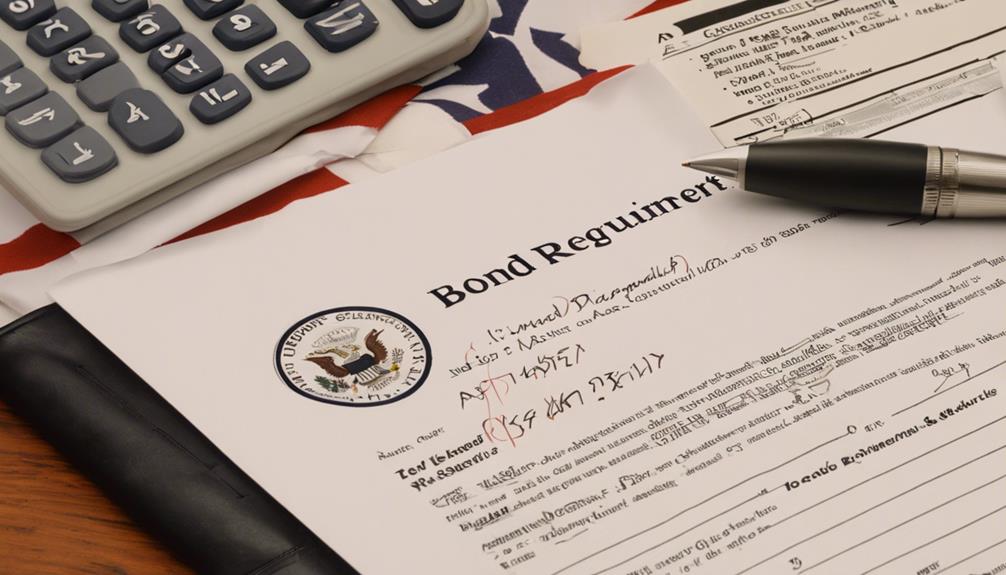If you're involved in the collection agency business in Washington, understanding the Washington Collection Agency Bond is essential. This $10,000 surety bond not only ensures you comply with state laws but also protects consumers from any unethical practices. It's more than just a requirement; it shapes the trust consumers place in your agency. But what does it take to obtain this bond, and how does it affect your daily operations? The answers could significantly impact your approach to business moving forward.
What Is a Collection Agency Bond?

A collection agency bond is a type of surety bond that ensures a collection agency operates ethically and follows state regulations. When you're starting or managing a collection agency, obtaining this bond is crucial. It acts as a safeguard for consumers and clients against potential misconduct or unethical behavior by your agency.
Essentially, the bond provides a financial guarantee that you'll adhere to all applicable laws and regulations in your collection practices. This requirement varies by state and helps maintain trust and ethical practices within the industry, ensuring that agencies are held accountable for their actions bonding requirements differ by state.
If your agency fails to comply, the bond can cover claims made against it, offering protection to those affected. This means that your agency's reputation and financial stability hinge on your ability to act responsibly. The bond helps build trust with your clients, as they can feel assured that you're committed to ethical operations.
Moreover, most states require collection agencies to secure this bond before they can legally operate. This requirement ensures that only those who meet the necessary standards can engage in debt collection.
Importance of the Bond
The collection agency bond plays a vital role in ensuring your business operates with integrity and compliance. By securing this bond, you demonstrate your commitment to following state regulations and ethical practices. This not only builds trust with clients but also safeguards your agency against potential financial losses resulting from unethical behavior.
Additionally, having a bond can provide clients with financial protection similar to immigration consultant bonds, ensuring accountability and trust in your services.
Moreover, having a bond can enhance your agency's reputation. Clients are more likely to choose a bonded agency, knowing they've a layer of protection. This bond serves as a safety net, ensuring that funds collected on behalf of clients are handled responsibly.
If a dispute arises or a violation occurs, the bond can provide compensation for losses incurred, thus protecting both your agency and your clients.
Ultimately, securing a collection agency bond not only fulfills legal obligations but also establishes your agency as a trustworthy and reliable partner in the industry.
Bond Requirements in Washington

When operating a collection agency in Washington, you'll need to meet specific bond requirements to ensure compliance with state regulations. The state mandates that all collection agencies obtain a surety bond, typically set at $10,000. This bond serves as a financial guarantee that you'll adhere to the laws governing debt collection practices.
You'll also need to work with a licensed surety bond provider to secure this bond. They'll evaluate your financial history and business practices to determine your eligibility. Remember, the bond must remain active for the duration of your agency's license.
If you fail to comply with regulations or if your agency faces legal claims, the bond can be used to cover any resulting damages or fines.
Additionally, keep in mind that the bond isn't just a formality; it protects both consumers and your agency. By securing this bond, you demonstrate your commitment to ethical practices and compliance with state laws, which can enhance your agency's reputation.
Failure to maintain the bond can lead to penalties, including the potential loss of your business license, so it's crucial to stay on top of these requirements.
How to Obtain the Bond
To obtain the surety bond required for your collection agency in Washington, you'll first need to gather essential documents that showcase your business's financial health. This typically includes your financial statements, credit history, and any relevant business licenses.
Make sure your paperwork is organized and readily available, as this will streamline the application process. Additionally, ensure that you have a history free of bond claims, as this is crucial for your eligibility and approval. Understanding the eligibility criteria for bonds can further help you prepare effectively.
Next, research and select a reputable surety bond provider. Look for companies that specialize in collection agency bonds and have positive reviews. You can reach out to multiple providers to compare terms and services.
Once you've chosen a provider, submit your gathered documents along with your application. The surety company will assess your financial stability and may require additional information or clarification during their review.
Be prepared to discuss your business operations and any relevant experience in the industry. After approval, you'll receive a quote for the bond, which you'll need to review carefully.
Once you agree to the terms, the provider will issue the bond, allowing you to officially operate your collection agency. Remember to keep your bond renewed as required to maintain compliance with state regulations.
Costs Associated With the Bond

After securing your surety bond, understanding the costs associated with it is vital for budgeting your collection agency's expenses. The total cost of the bond isn't just the premium; it includes various factors that you need to consider.
The premium is usually a percentage of the bond amount, typically ranging from 1% to 15%, based on your credit score and financial history. If you have excellent credit, you'll likely pay a lower premium, while a poor credit score can significantly increase your costs.
Additionally, some bonding companies may charge administrative fees for processing your application, which can add to your overall expenses. It's essential to inquire about these fees upfront to avoid surprises later.
You should also keep in mind that bond premiums are often paid annually, meaning you'll need to budget for this recurring expense each year.
If your agency expands or the bond amount changes, the premium may also adjust.
Responsibilities of Collection Agencies
Collection agencies have a crucial role in the debt recovery process, and it's essential that they adhere to specific responsibilities. First and foremost, you need to ensure compliance with federal and state laws governing debt collection practices. This means understanding the Fair Debt Collection Practices Act (FDCPA) and state-specific regulations to avoid illegal tactics.
You're also responsible for maintaining accurate records of all communications with debtors. This documentation is vital for tracking payments and disputes, ensuring transparency in your operations.
It's important to treat all debtors with respect and professionalism, as your actions reflect on your agency's reputation. Furthermore, you should promptly inform creditors of any payments received, ensuring that funds are allocated correctly. Regular communication with both debtors and creditors aids in building trust and can lead to quicker resolutions.
Lastly, it's your duty to provide training for your staff on ethical collection practices. This not only improves your team's efficiency but also mitigates the risks associated with potential violations. By fulfilling these responsibilities, you contribute to a more effective and ethical debt recovery process.
Impact on Consumers

The responsibilities of collection agencies don't just impact their operations; they also significantly affect consumers. When agencies follow the rules, they provide a fair process that helps you resolve debts without excessive stress. However, if they cut corners or act unethically, you may find yourself facing harassment, misleading information, or even legal issues.
You deserve to be treated with respect and transparency during the collection process. The Washington Collection Agency Bond acts as a safety net, ensuring that agencies adhere to ethical standards. This bond protects you by holding agencies accountable for their actions. If they violate any regulations, you can file a claim and seek compensation for any damages you've incurred.
Moreover, the bond helps foster trust between you and the collection agency. Knowing that they're required to operate fairly can ease some anxiety surrounding debt collection.
In essence, these regulations aim to create a balanced environment where you can navigate your financial responsibilities without fear. Ultimately, understanding the impact of these agencies on your life can empower you to stand up for your rights and ensure you're treated justly throughout the process.
Conclusion
In conclusion, the Washington Collection Agency Bond is vital for ensuring fair practices in the debt collection industry. By holding agencies accountable, it protects your rights as a consumer and promotes transparency in financial transactions. If you're considering working with a collection agency, make sure they're bonded. This not only fosters trust but also gives you peace of mind knowing that there's a financial safeguard in place against potential misconduct. Stay informed and protected!


